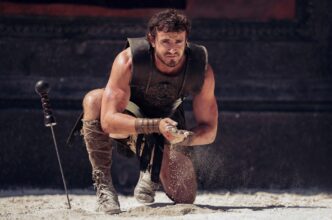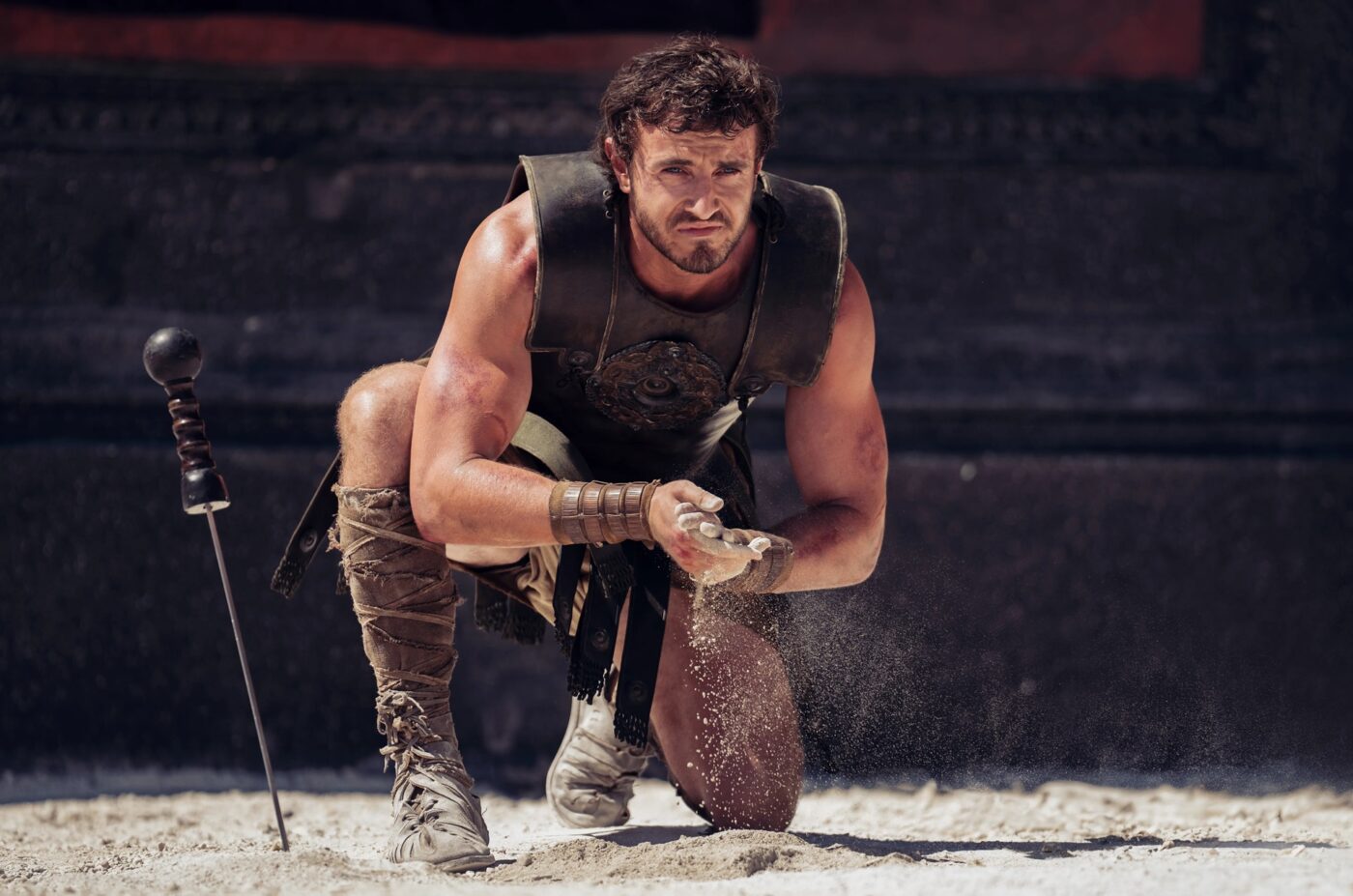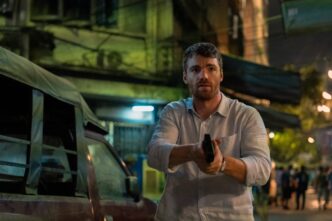A Good Follow-Up (That's Still Stuck in the Original's Shadow)
Summary
Ridley Scott’s Gladiator 2 delivers grand spectacle, compelling performances, and intense Colosseum battles. However, its reliance on nostalgia and parallels to the original leave it struggling to establish its own identity as a standalone epic.
Overall
-
Plot
-
Narrative
-
Acting
-
Characterization
-
Action
-
Direction
-
Pacing
User Review
( votes)It’s always a gamble when a beloved film gets a sequel years later. How do you balance honoring the original without feeling derivative? Ridley Scott’s Gladiator 2 walks this tightrope with ambition and a degree of success. The film is undeniably grand, a sweeping spectacle with impressive performances and visual splendor. Yet, for all its strengths, it often feels trapped under the shadow of its predecessor, struggling to carve out a story that stands on its own.
The story picks up nearly two decades after the death of Maximus Decimus Meridius, and the world of Rome is no closer to stability. The vacuum left behind by Maximus’s sacrifice has bred chaos, with power struggles dominating the empire’s political landscape. At the heart of the story is Lucius Verus (Paul Mescal), the now-grown son of Lucilla (Connie Nielsen). Lucius is not only navigating the weight of his connection to Maximus but is also forced into a journey that eerily mirrors his mentor’s: grief, enslavement, and a rise through the gladiatorial arena.
Paul Mescal is an intriguing choice for the lead, stepping into a role inevitably compared to Russell Crowe’s towering presence. Lucius is a quieter figure, his strength rooted more in resilience than the fiery determination that defined Maximus. Mescal’s nuanced performance captures Lucius’s inner turmoil, but his understated approach occasionally feels at odds with the operatic tone of the film. The moments where Lucius is called to inspire others—whether through rousing speeches or bold acts of defiance—lack the magnetic pull of Maximus’s iconic declarations.
One of the film’s strengths lies in its exploration of Lucius’s relationships, particularly with his mother Lucilla and the enigmatic Macrinus, played by Denzel Washington. Lucilla, who once faded into the background of Gladiator, emerges here as a force to be reckoned with. Connie Nielsen imbues the character with a quiet strength, her steely resolve driving much of the political intrigue. Meanwhile, Washington’s Macrinus is a fascinating figure, a former slave turned gladiator trainer whose allegiances are as unpredictable as his motivations.
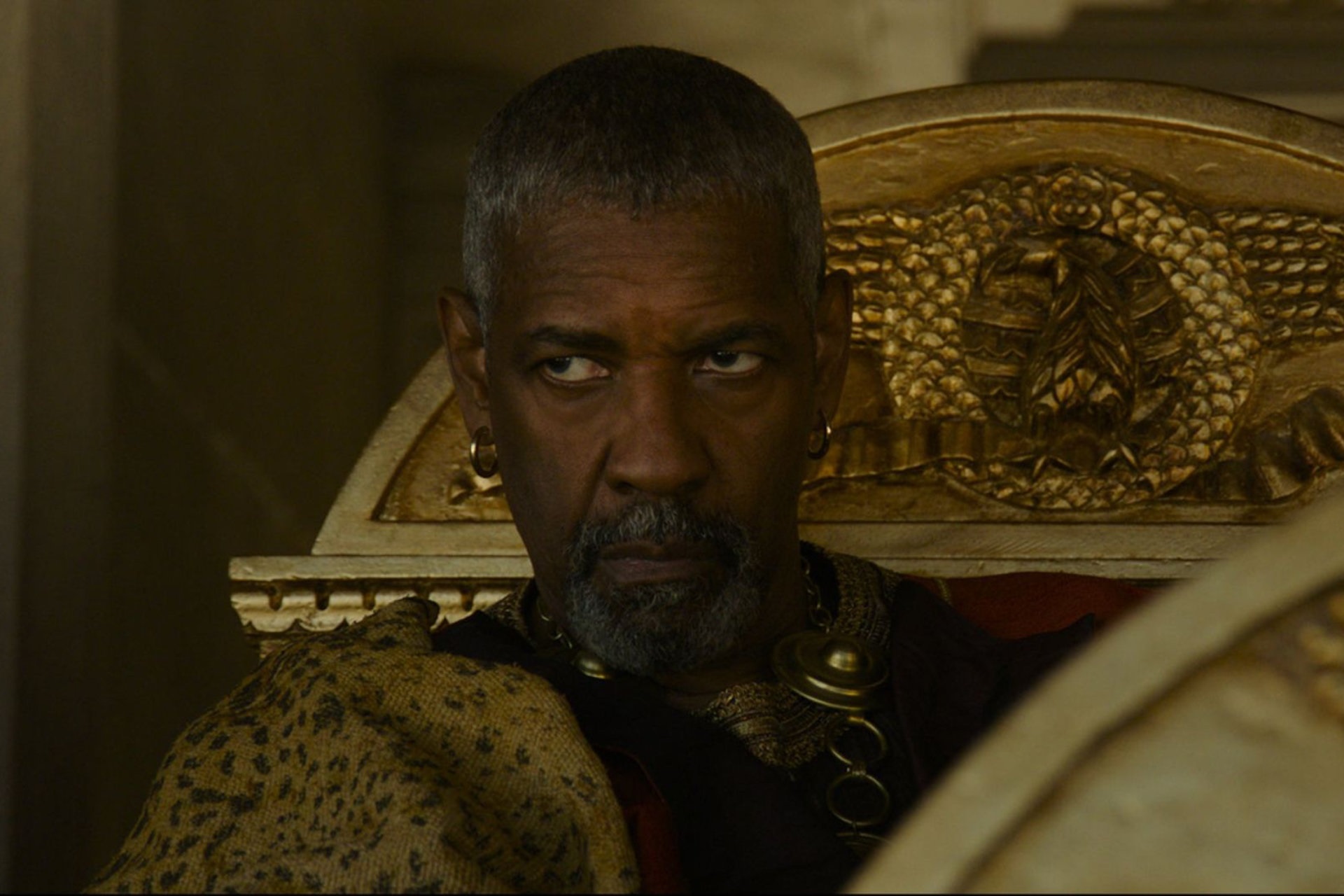
Denzel Washington is, without question, the standout of the film. His performance radiates charisma, switching effortlessly between charming mentor and calculating manipulator. Macrinus’s presence injects much-needed complexity into the narrative, often overshadowing Lucius’s comparatively straightforward arc. Whether delivering whispered threats or grand speeches, Washington commands the screen, elevating every scene he’s in.
Pedro Pascal’s General Marcus Acacius also brings depth to the film, playing a morally conflicted military leader whose actions set the plot in motion. Acacius’s uneasy alliance with Lucilla and his fraught interactions with Lucius add layers to a story that, at its core, is still about personal vengeance and systemic decay.
The twin emperors, Geta (Joseph Quinn) and Caracalla (Fred Hechinger), provide a touch of dark humor amidst the chaos. Their cartoonish debauchery and unpredictable cruelty serve as a stark reminder of Rome’s moral decline. While their antics border on slapstick at times—complete with a bizarrely memorable monkey in a dress—they effectively underscore the rot at the empire’s heart.
Ridley Scott’s direction ensures that the film is nothing short of breathtaking. The Colosseum sequences are a masterclass in spectacle, from naval battles staged within the arena to a chaotic encounter involving a rampaging rhino. These moments showcase Scott’s unparalleled ability to craft large-scale action with visceral intensity. The arena scenes are rich with decadence and brutality, capturing both the awe and horror of Rome’s obsession with bloodsport.
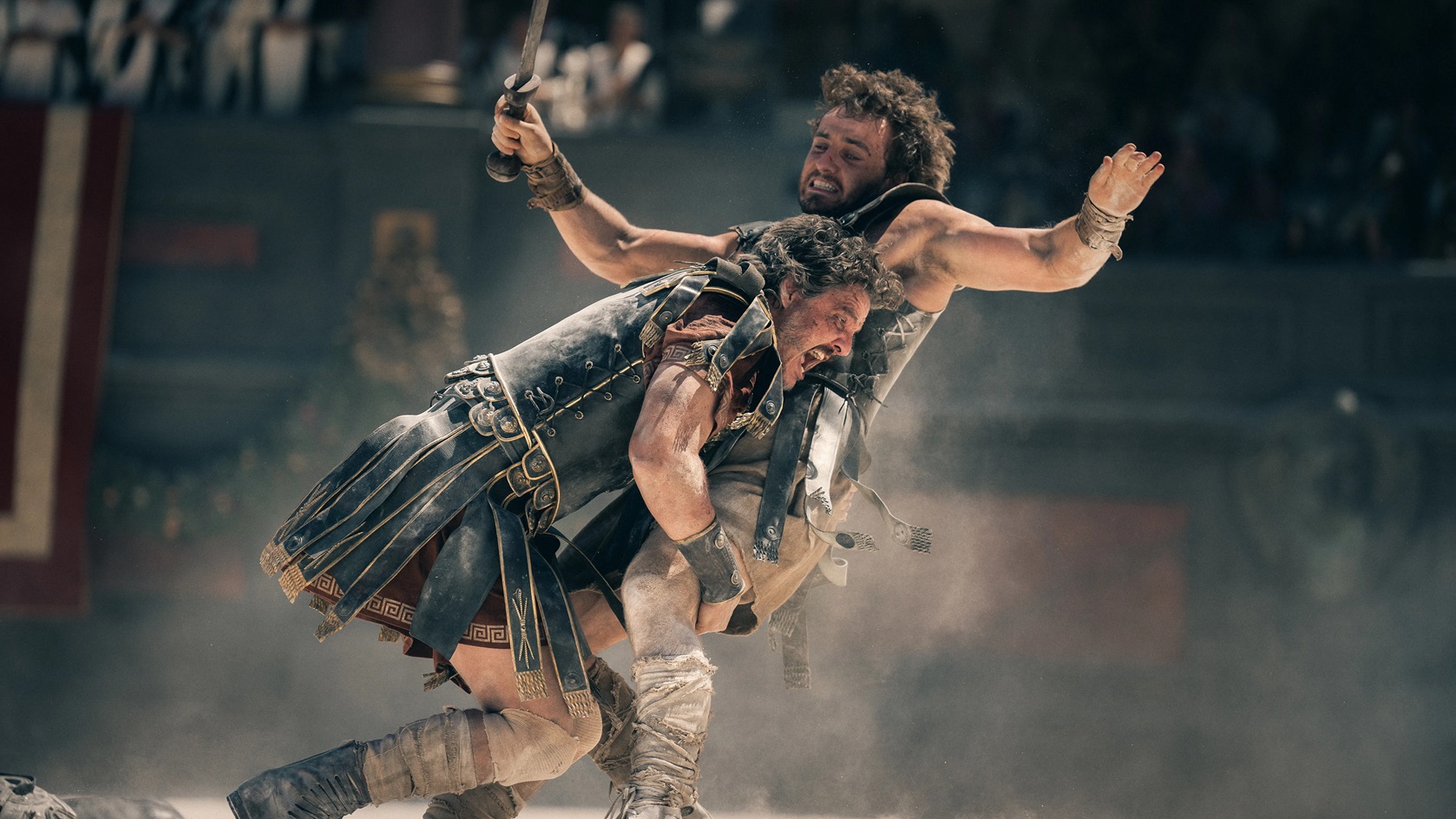
Yet, for all its visual brilliance, the film occasionally stumbles in its storytelling. Much of the narrative feels like a retread of the original Gladiator, with Lucius’s journey echoing Maximus’s at nearly every turn. The script, penned by David Scarpa, leans heavily on callbacks and nostalgia, sometimes to the detriment of its characters. Lucius’s arc, while compelling, is often overshadowed by the film’s reverence for Maximus. From donning Maximus’s armor to invoking his ideals, Lucius struggles to step out of his mentor’s shadow, leaving the audience yearning for a more distinct identity.
Thematically, Gladiator 2 grapples with questions of legacy and leadership. Lucius’s reluctance to embrace his role as a symbol of change mirrors Rome’s own existential crisis. The film attempts to explore the generational discontent of a society torn between its past and its future, but these ideas often feel underdeveloped. The dream of a more egalitarian Rome, central to Maximus’s sacrifice, is revisited here but lacks the urgency and clarity that made it resonate in the original.
Despite its thematic shortcomings, Gladiator 2 delivers where it matters most: as an epic spectacle. The battles are a visual feast, combining cutting-edge effects with Scott’s meticulous eye for detail. From the storming of Numidia to the intricate gladiatorial matches, the film never loses its sense of scale. However, some of the larger set pieces—such as a naval battle in the flooded Colosseum—feel more like showcases of technical prowess than integral parts of the story. The quieter, more intimate confrontations often pack a greater emotional punch, reminding us of the humanity beneath the spectacle.
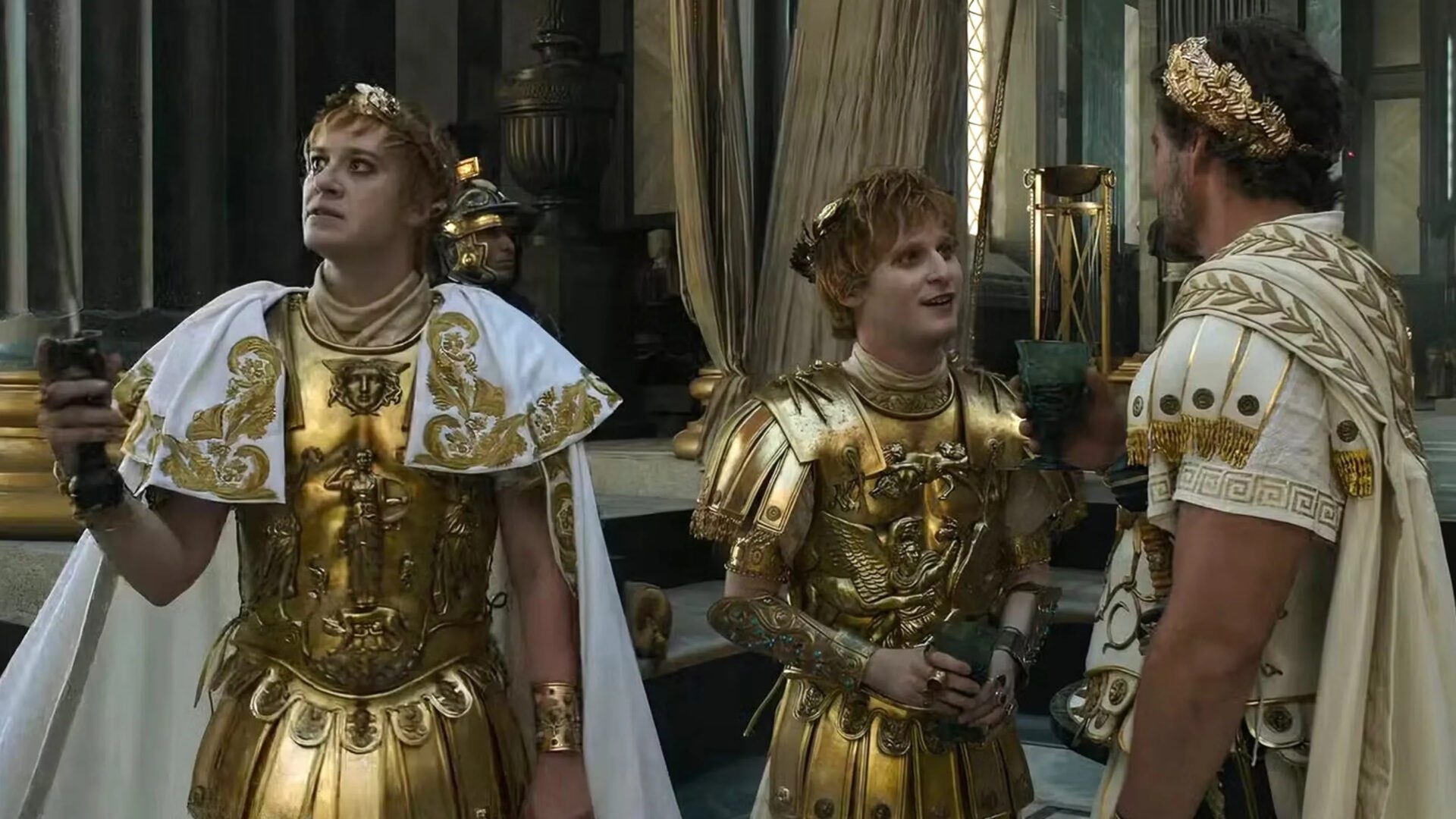
The performances across the board are stellar, with the supporting cast bringing depth and nuance to their roles. Connie Nielsen’s Lucilla is a revelation, her character’s growth providing a strong emotional anchor. Pedro Pascal brings gravitas to General Acacius, while Joseph Quinn and Fred Hechinger revel in the chaos of their villainous roles. Yet, it’s Denzel Washington who steals the show, his Macrinus serving as both a foil and a mirror to Lucius.
Ultimately, Gladiator 2 is a film that thrives on its ambition but falters in its execution. It’s a worthy companion to the original, offering enough spectacle and drama to entertain, but it never quite escapes the shadow of its predecessor. The film’s reliance on nostalgia, while effective in moments, often feels like a missed opportunity to push the story into new territory.
For fans of the original, Gladiator 2 offers a chance to revisit the grandeur of ancient Rome through Ridley Scott’s masterful lens. It’s a film that celebrates the legacy of Gladiator while grappling with the weight of its own expectations. Are we entertained? Certainly. But as the credits roll, one can’t help but wonder what might have been if the film had dared to carve out a legacy of its own.
